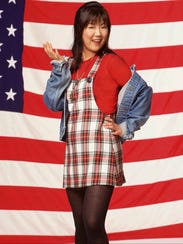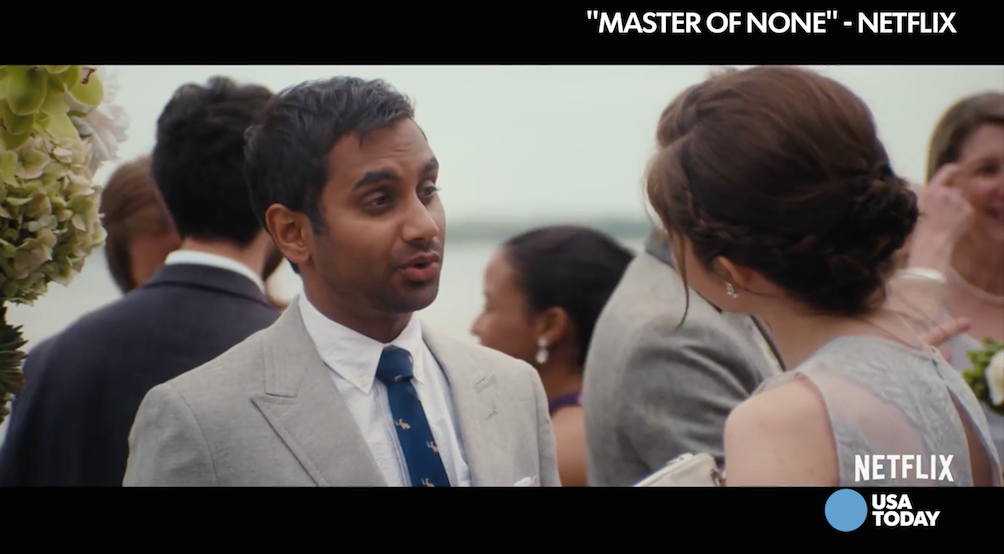‘Boat,’ ‘Master’ have raised bar for more complexity
By Patrick Ryan

(Photo: Vivian Zink, ABC)
USA Today, November 16, 2015 — In an episode of ABC sitcom Fresh Off the Boat earlier this month, Louis Huang (Randall Park) is chided by his wife (Constance Wu) for his appearances on a local morning show: first, for his Donald Duck and Rocky impressions; then, for acting too uptight.
“You need to go back out there and show people you can laugh at yourself,” she insists. “But be serious, too. A couple of light jokes. Nothing political. Don’t be boring, either. But be interesting. And pleasant. And also smart. And tall.”
Though tongue-in-cheek, her demands play into a larger conversation Boat is having about Asian representation in pop culture, particularly as more actors and writers move to TV’s forefront.
Indian-Americans Mindy Kaling (Hulu’s The Mindy Project) and Aziz Ansari (Netflix’s Master of None) each write and star in their own shows, while film superstar Priyanka Chopra is front and center as an FBI trainee in ABC’s new Quantico. Meanwhile, Korean-Americans Ken Jeong (ABC’s Dr. Ken) and Ki Hong Lee (Netflix’s Unbreakable Kimmy Schmidt) appear in new comedies, and Chinese-American Daniel Wu leads AMC’s martial-arts drama Into the Badlands. Actors including Kumail Nanjiani (HBO’s Silicon Valley), Kunal Nayyar (CBS’ The Big Bang Theory), Daniel Dae Kim (Hawaii Five-0) and Kimiko Glenn (Netflix’s Orange is the New Black) also are part of diverse ensembles on network and cable television.
It’s a far cry from the 1970s, when white actor David Carradine portrayed the Chinese lead in Kung Fu. With more Asian talent in front of and behind the camera, “it’s not like we’re fighting for the final piece of the pie that nobody wants — now, we’re actually in the kitchen making the pies ourselves,” says Boat executive producer Nahnatchka Khan, an Iranian-American. “We’re getting to create new opportunities and present characters in a different way than in the past.”

Stand-up comedienne Margaret Cho starred as the Korean-American Margaret Kim in ABC’s ‘All-American Girl,’ which was canceled after one season. (Photo: Blake Little, ABC)
But with diversity comes higher expectations for complex Asian characters. After all, the last sitcom about an Asian-American family on TV was Margaret Cho’s short-lived All-American Girl on ABC in 1994-95, which was critically derided for its broad characters and reliance on stereotypes. It’s a criticism Boat faced when it premiered this year, particularly from its outspoken creator Eddie Huang, whose memoir inspired the series. In April, Huang took the show to task on Twitter for perpetuating an “artificial representation” of Asian-American lives.
When Boat started, “people were nervous and excited and worried,” Khan says. “We would all talk amongst ourselves and be like, ‘Wow, Brooklyn Nine-Nine just gets to be a funny show. They don’t have to worry about being all things to all people, because that’s impossible.’ ” But rather than view the added pressure as unfair, Khan says “it’s a good opportunity” to make a better show, by addressing weightier topics and hiring more diverse writers and directors for Season 2.
Kenalso has received backlash from Asian writers such as Arthur Chu and Christine Jun, who in a column for Salon.com accused the show of “pandering to a white outsider’s gaze for approval.”
But ultimately, “everyone recognizes (these shows are) a positive thing, because the worst form of marginalization is to have no kind of voice and be invisible and be in completely stereotyped representations,” says Stephen Gong, executive director of the Center for Asian American Media. “It’s real progress, and that is great.”

‘Master of None’ co-creator Alan Yang, left, with stars Lena Waithe, Aziz Ansari, Kelvin Yu, Eric Wareheim and Noel Wells. (Photo: Greg Allen, Invision/AP)
Still, Asian actors claimed just 4% of scripted roles on broadcast series in the 2012-13 TV season and 3% on cable, according to a UCLA study released this year, though those numbers have since increased. It’s a scarcity that Master of None addresses in an episode called “Indians on TV,” which premiered this month. In it, the show’s protagonist Dev (Ansari), a struggling actor, refuses to do an Indian accent in an audition to play a cab driver, and later is told that either he or his fellow Indian actor (Ravi Patel) can star in a network sitcom, but not both of them together.
“I wouldn’t say we specifically had an ax to grind, but we wanted to reflect our experiences of working in the entertainment industry as people of Asian descent,” says Taiwanese-American co-creator Alan Yang (Parks and Recreation).
Although Master has been praised for episodes about Asian families and the immigrant experience, Dev’s dates on the show have been a point of contention among some viewers for being exclusively white. Kaling last week responded on Twitter to similar criticism of her own character on Mindy, saying, “Someone write an article about white leads on shows who won’t date outside their race. You’ve got PLENTY of options.”
Yang takes a similar stance in his defense of Master. “No one’s really yelling that Zooey Deschanel should definitely date an Asian guy (on New Girl). That’s not happening that much,” he says. That said, “We’ve done 10 episodes of the show and (Dev) has really dated two or three people. If we were to do 100 episodes, I guarantee he wouldn’t date 100 white women like Jerry Seinfeld did in the hit TV comedy Seinfeld. So give us a few more episodes.”

Aziz Ansari’s new Netflix series “Master of None” has been a hit. The comedian spoke to USA TODAY on the success of his new show and his career.











